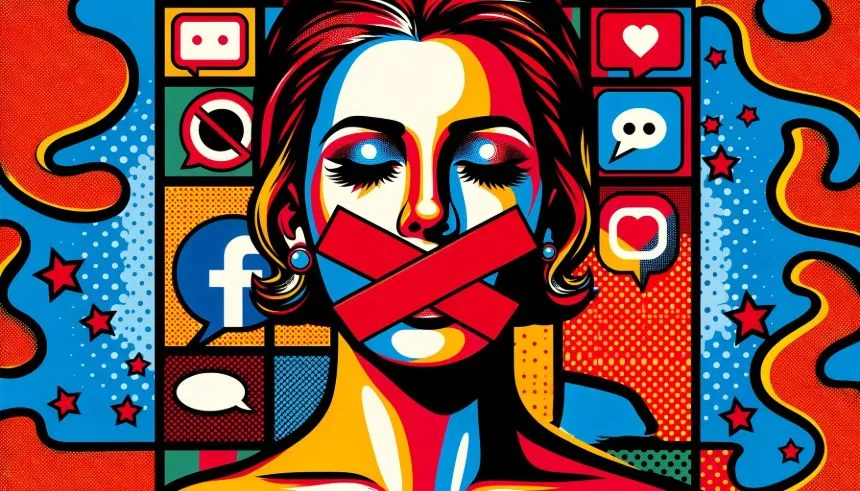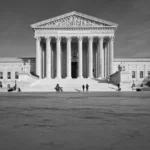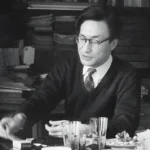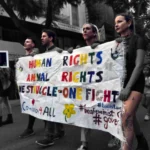Freedom of expression is a fundamental part of living in a free and open society and a basic need of every human being. Its absence has significant consequences, not only for individuals but also for the entire social community. This paper examines the relationship between freedom of expression, public morality, and democracy, and how modern challenges threaten these principles, resulting in increased social vulnerability. The suppression of free speech makes individuals more vulnerable and weakens democratic systems.
Historically, freedom of expression has been intertwined with other core liberties such as freedom of conscience, religion, thought, belief, opinion, and the right to peaceful assembly and association. These freedoms were central to liberal constitutionalism and have been essential elements of constitutional democracies since the end of World War II. As Franklin D. Roosevelt articulated in his 1941 State of the Union address, freedom of speech and expression are foundational to the democratic ethos and were among the primary aims during the war against tyranny.
The ongoing battle to safeguard freedom of expression underscores its critical importance in maintaining a vibrant and healthy democracy.
Despite these protections, contemporary challenges to freedom of expression arise from various forms of social pressure and governmental policies that undermine the plurality of opinions. These pressures can manifest in censorship, both direct and indirect, where individuals are deterred from expressing their thoughts due to fear of backlash or punitive actions. This suppression not only silences individuals but also erodes the democratic fabric of society, leading to increased vulnerability among those who are unable or unwilling to voice their dissenting opinions.
The decline in freedom of expression creates a chilling effect, where the fear of repercussions prevents open dialogue and the exchange of ideas. This environment stifles innovation, critical thinking, and the ability to address societal issues effectively. In such a climate, both individual and collective progress is hampered, and the overall health of the democratic system is jeopardized.
Historical Context of Freedom of Expression
Freedom of expression has a complex history rooted in the cultural and intellectual movements of the Enlightenment. Thinkers like Kant emphasized the importance of the individual’s right to express opinions publicly, even against sovereign authority. Kant argued that freedom of writing is crucial for defending the rights of the people, provided it respects the constitutional framework.
Public morality should be shaped by citizens through freedom of expression.
The French Declaration of the Rights of Man and Citizen (1789) was a pivotal document, proclaiming the unrestrained communication of thoughts and opinions as one of the most precious rights.
Article 11 of the Declaration explicitly stated that every citizen may speak, write, and publish freely, with accountability for any abuses of this liberty as determined by law. This principle was incorporated into the first French Constitution in 1791, which underscored the natural and civil right to freedom of speech.
Similarly, the United States enshrined freedom of speech in the First Amendment to its Constitution in 1791, prohibiting Congress from making laws that abridge the freedom of speech or press. This foundational text reflects the Enlightenment’s influence and the commitment to protecting individual liberties against government overreach.
In Spain, the development of freedom of expression was marked by significant legal milestones. The Constitution of Cadiz (1812) was one of the earliest documents to guarantee the liberty to write, print, and publish political ideas without prior censorship. This principle was further reinforced by subsequent Spanish constitutions, including the 1869 Constitution, which explicitly protected the right to freely express ideas and opinions.
However, the practical application of these rights faced numerous challenges. For instance, during the Liberal Triennium (1820–1823), the exercise of freedom of expression encountered opposition from various groups, leading to the implementation of restrictive measures and the inclusion of limitations in the Spanish Criminal Code.
These historical developments highlight the enduring struggle to protect freedom of expression against various forms of suppression. Despite the legal recognition of this fundamental right, societal and governmental pressures have continuously threatened its full realization. The ongoing battle to safeguard freedom of expression underscores its critical importance in maintaining a vibrant and healthy democracy.
Public Morality and Its Models: Libertarianism vs. Perfectionism
Public morality is a set of beliefs and values widely accepted by society, constantly evolving over time. In democracies, public morality should be shaped by citizens through freedom of expression. Two main models influence public morality: libertarianism and perfectionism.
Libertarians prioritize individual freedom, opposing any ethical constraints on personal decisions. They argue that freedom is the fundamental ethical principle and that any attempt to reduce a person’s capacity to make choices is an illegitimate interference. This perspective extends to various areas, including euthanasia, abortion, drug use, and economic policies. For example, libertarians would oppose laws that prohibit or mandate certain actions, advocating instead for personal autonomy and the right to choose. Libertarianism thus resists ethical impositions, advocating for minimal state intervention in personal choices.
Balancing individual freedom with the promotion of the common good remains a central dilemma for policymakers and citizens alike.
Perfectionists, on the other hand, believe in promoting virtuous conduct for the common good. They argue that society should shape exemplary citizens by establishing ethical standards that promote justice and social peace. This perspective is rooted in the philosophies of Plato, Aristotle, and Thomas Aquinas, who emphasized the importance of virtuous conduct for societal well-being. Perfectionists advocate for laws and policies that reflect these ethical standards, aiming to shape citizens’ behavior in a way that benefits the entire community. They maintain that individual freedom should be balanced with the need to promote virtue and the common good, often through state intervention.
The tension between these two models is evident in their approaches to public ethics. Libertarians criticize perfectionist policies as paternalistic and infringing on individual autonomy. In contrast, perfectionists argue that without a framework of ethical standards, society cannot ensure justice and social stability. This ongoing struggle shapes public morality and impacts democratic societies, as both models seek to influence public ethics through education, culture, and law.
The debate between libertarianism and perfectionism also extends to how public morality should be taught and enforced. Libertarians emphasize the role of free markets and voluntary associations in shaping ethical standards, while perfectionists support state-led initiatives and regulations to promote virtuous conduct. This dichotomy is evident in debates over issues such as drug legalization, where libertarians advocate for decriminalization and individual choice, whereas perfectionists push for strict regulations to protect societal well-being.
The conflict between libertarianism and perfectionism highlights the complexity of shaping public morality in democratic societies. Both models offer valuable insights but also pose significant challenges. Balancing individual freedom with the promotion of the common good remains a central dilemma for policymakers and citizens alike. The ongoing dialogue between these perspectives is crucial for maintaining a dynamic and inclusive public morality that reflects the diverse values and beliefs of a democratic society.
Public Morality, Deliberative Democracy, and Freedom of Expression
In a deliberative democracy, public morality is shaped by the dynamic interaction between private and public moralities, facilitated by freedom of expression. Citizens must be free to express dissenting opinions without fear of retribution, as this is essential for democratic decision-making. The law should protect and promote the free expression of ideas, even those contrary to prevailing public ethics. This ensures a constant flux between private and public moralities, fostering a culture of dialogue and mutual respect. Prohibiting dissent or limiting freedom of expression undermines democracy and reduces individuals’ ability to contribute to shaping their political community, making them more vulnerable.
Deliberative democracy requires that the state refrains from being the primary agent in shaping public morality.
The essence of deliberative democracy lies in the ability of citizens to engage in fair and reasonable discussion and debate. This process requires that individuals can express their private moralities and challenge public ethics without facing legal or social repercussions.
The law should not only allow but also encourage this exchange of ideas, ensuring that public morality remains a reflection of the diverse views within society. By fostering an environment where dissent is protected, democratic systems can maintain their integrity and resilience against authoritarian tendencies.
A key aspect of this dynamic process is the protection of minority opinions. In a truly democratic society, the views of minority groups must be given the same consideration as those of the majority. This inclusiveness is crucial for preventing the dominance of a single perspective and ensuring that public morality is continually shaped by a broad range of voices. The suppression of dissenting opinions not only undermines the democratic process but also creates a culture of conformity that stifles innovation and progress.
Moreover, deliberative democracy requires that the state refrains from being the primary agent in shaping public morality. Instead, it should facilitate a framework where individuals and diverse groups can contribute to the ongoing dialogue about societal values. This approach ensures that public morality is not static but evolves with the changing beliefs and needs of society. It also prevents the imposition of a monolithic set of values that may not reflect the pluralistic nature of a democratic community.
For democracy to thrive, it is essential that public morality is not dictated by powerful lobbies or the state but is a product of the collective input of its citizens. This requires a legal and social environment that supports the free exchange of ideas, protects dissent, and encourages active participation in public discourse. By doing so, democratic societies can ensure that public morality remains relevant, inclusive, and reflective of the diverse views of its members.
Democracy, Freedom of Expression, and the Right to Dissent
There is no democracy without freedom of expression, and this freedom is only real if it includes the right to dissent. Rejecting dissent undermines deliberative democracy and leads to authoritarianism. True democracy requires that citizens can think for themselves, express their thoughts publicly, and contribute to shaping public ethics. This dynamic process prevents democratic corruption and ensures that the political freedom of a community is based on the sum of individual freedoms. Laws should protect the expression of dissenting opinions, as long as they do not incite hatred or violence. This protection is essential for maintaining a pluralistic and inclusive democracy.
Freedom of expression is essential for political liberalism, human development, and social happiness.
Dissent is often seen as a threat to social harmony, but it is actually a vital component of a healthy democracy.
It allows for the airing of diverse viewpoints and the questioning of established norms, which can lead to social and political reforms.
Without the ability to dissent, societies risk stagnation and the entrenchment of unjust practices. Therefore, protecting the right to dissent is crucial for the continuous evolution and improvement of democratic systems.
Moreover, the suppression of dissent can lead to a culture of fear and self-censorship. When individuals are afraid to express their views, they are less likely to engage in public discourse and contribute to the democratic process. This fear can be exacerbated by legal measures, social pressures, and media campaigns that aim to silence opposition. In such an environment, the quality of public debate suffers, and the ability of society to address complex issues is diminished. Ensuring that dissenting voices are heard and respected is essential for fostering a vibrant and resilient democracy.
A democratic society must also ensure that dissent is not only tolerated but valued as a means of strengthening the community. This involves recognizing that dissenting opinions can provide valuable insights and contribute to the overall understanding of societal issues. Encouraging a culture where dissent is seen as an opportunity for growth rather than a threat can lead to more robust and adaptive democratic institutions.
Furthermore, protecting the right to dissent helps prevent the concentration of power and promotes accountability. When individuals and groups can freely express their disagreements, they can challenge and scrutinize those in positions of authority. This scrutiny is essential for preventing abuses of power and ensuring that leaders remain responsive to the needs and concerns of the populace. By fostering an environment where dissent is protected and valued, democratic societies can maintain a healthy balance of power and promote a more just and equitable society.
Freedom of Expression as a Condition for Political Liberalism: Human Development and Social Happiness
Freedom of expression is essential for political liberalism, human development, and social happiness. Early modern constitutions linked freedom with happiness, emphasizing the pursuit of happiness as a natural right. Thomas Jefferson’s American Declaration of Independence and the French Declaration of the Rights of Man and Citizen both highlighted the connection between liberty and happiness. Freedom of expression enables individuals to communicate their thoughts and ideas, fostering human dignity and personal development. It is also crucial for societal progress and the development of democratic societies, as it allows for the exchange of ideas and the pursuit of truth.
Modern threats to freedom of expression, such as cancel culture, increase social vulnerability.
John Stuart Mill’s work, “On Liberty,” presents one of the most famous liberal defenses of free speech. Mill argued that everyone should be allowed to profess and discuss any doctrine, regardless of how immoral it may be considered by others.
He believed that the suppression of an opinion is harmful to society because it deprives humanity of the opportunity to discover the truth. For Mill, free speech fosters authenticity, creativity, individuality, and human flourishing, which are all essential for personal and societal development.
Mill’s harm principle provides a clear justification for limiting free speech only when it causes harm to others. This principle ensures that the freedom to express ideas is protected while preventing speech that could lead to significant harm. By upholding this principle, democratic societies can strike a balance between protecting individual freedoms and maintaining social order. The recognition of the fundamental role of free speech in promoting human development and social happiness underscores its importance in political liberalism and democratic governance.
The historical context of linking freedom with happiness can be traced back to the Virginia Declaration of Rights, which influenced the drafting of the American Declaration of Independence. George Mason’s phrase “pursuit of happiness” was central to the articulation of inherent rights, including life, and liberty. This concept was further echoed in European constitutional documents, such as the French Constitution of 1793, which emphasized that the aim of society is the general welfare and the enjoyment of natural and inalienable rights.
Freedom of expression, therefore, is not merely a political right but a fundamental aspect of human flourishing. It allows individuals to develop their intellectual, practical, and moral abilities, contributing to personal growth and societal advancement. By fostering an environment where individuals can freely express their thoughts and ideas, democratic societies can promote a culture of continuous learning, innovation, and progress. This, in turn, leads to greater social happiness and a more vibrant and resilient community.
Threats of Freedom of Expression: Cancel Culture and Social Vulnerability
Modern threats to freedom of expression, such as cancel culture, increase social vulnerability. Cancel culture ostracizes individuals for expressing unpopular opinions, stifling open dialogue, and making people more vulnerable. This environment breaks the necessary flux between private and public moralities, undermining pluralism, and inclusiveness. Democratic societies must balance protecting vulnerable groups with preserving free speech for all citizens. Laws should safeguard the freedom of expression of vulnerable and marginalized groups without disproportionately restricting the expression of others. Ensuring a safe and inclusive environment for free speech is essential for maintaining democratic principles and protecting individuals from increased vulnerability.
Cancel culture often targets individuals for statements or actions deemed offensive or harmful by certain groups. This can lead to social ostracism, professional repercussions, and even threats to personal safety. While the intention behind cancel culture may be to protect vulnerable groups from harm, it often results in a chilling effect on free speech. People become hesitant to express their views, fearing backlash and punishment. This suppression of free speech undermines the democratic process by limiting the diversity of voices and perspectives in public discourse.
Vulnerable individuals, including those from marginalized groups, may be disproportionately affected by attempts to silence dissent.
The digital age has exacerbated these challenges, as online platforms can both amplify and endanger users. The anonymity provided by the internet can embolden individuals to engage in abusive and harassing behavior, increasing the vulnerability of those expressing dissenting views. At the same time, the global reach of the internet means that cancel culture can have far-reaching and severe consequences, impacting individuals’ lives and careers worldwide. To address these challenges, democratic societies must promote a culture of respect and tolerance, ensuring that all voices are heard and that dissenting opinions are not unjustly silenced.
The European Court of Human Rights (ECtHR) has recognized the importance of protecting freedom of expression, even for ideas that may offend, shock, or disturb. This protection is vital for maintaining a pluralistic and democratic society. However, the rise of cancel culture poses a significant threat to this principle, as it often seeks to silence voices that challenge the dominant narrative. Ensuring that freedom of expression is upheld in the face of cancel culture requires a commitment to protecting the rights of all individuals to express their views, regardless of how controversial they may be.
Suppose people demand protection from words and ideas they do not like, perhaps because they are not politically correct or because they go against the public morality of a particular moment, and laws do not allow the expression of such views that might cause emotional distress to some people. In that case, we have two different kinds of vulnerability: those prone to being emotionally distressed and those who are not allowed to express views that are not orthodox or might cause distress to some people.
In the end, what happens is that those who are not allowed to express their views, because of the social and legal consequences, become second-rate citizens. They also become more vulnerable (because they are not allowed to cause emotional distress with their opinions, while they cannot claim themselves distressed by the opinions of others), and, more importantly, democracy becomes weaker, less plural, and less inclusive.
The concept of vulnerability is central to understanding the impact of cancel culture on freedom of expression. Vulnerable individuals, including those from marginalized groups, may be disproportionately affected by attempts to silence dissent. Protecting their right to free speech is essential for ensuring that democratic societies remain inclusive and just. At the same time, it is crucial to balance this protection with measures that prevent the abuse of free speech to harm others. This balance can be achieved by promoting respectful and constructive dialogue, and by implementing laws that protect individuals from harassment and discrimination without unduly restricting their freedom of expression.
Adapted from an academic article for a wider audience, under license CC BY 4.0






